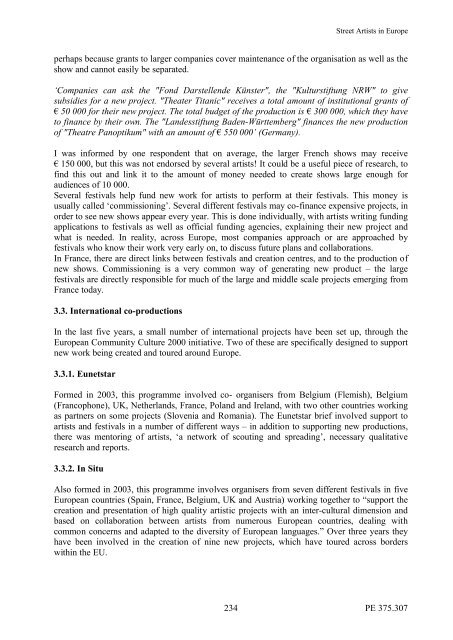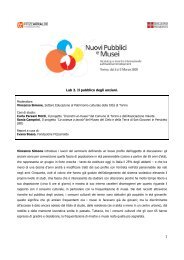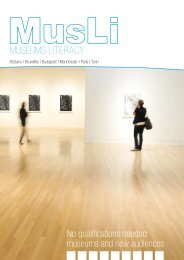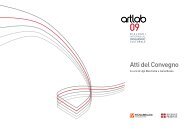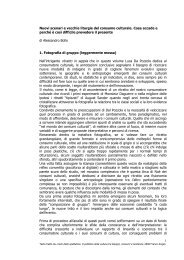STREET ARTISTS IN EUROPE - Fondazione Fitzcarraldo
STREET ARTISTS IN EUROPE - Fondazione Fitzcarraldo
STREET ARTISTS IN EUROPE - Fondazione Fitzcarraldo
Create successful ePaper yourself
Turn your PDF publications into a flip-book with our unique Google optimized e-Paper software.
Street Artists in Europe<br />
perhaps because grants to larger companies cover maintenance of the organisation as well as the<br />
show and cannot easily be separated.<br />
‘Companies can ask the "Fond Darstellende Künster", the "Kulturstiftung NRW" to give<br />
subsidies for a new project. "Theater Titanic" receives a total amount of institutional grants of<br />
€ 50 000 for their new project. The total budget of the production is € 300 000, which they have<br />
to finance by their own. The "Landesstiftung Baden-Württemberg" finances the new production<br />
of "Theatre Panoptikum" with an amount of € 550 000’ (Germany).<br />
I was informed by one respondent that on average, the larger French shows may receive<br />
€ 150 000, but this was not endorsed by several artists! It could be a useful piece of research, to<br />
find this out and link it to the amount of money needed to create shows large enough for<br />
audiences of 10 000.<br />
Several festivals help fund new work for artists to perform at their festivals. This money is<br />
usually called ‘commissioning’. Several different festivals may co-finance expensive projects, in<br />
order to see new shows appear every year. This is done individually, with artists writing funding<br />
applications to festivals as well as official funding agencies, explaining their new project and<br />
what is needed. In reality, across Europe, most companies approach or are approached by<br />
festivals who know their work very early on, to discuss future plans and collaborations.<br />
In France, there are direct links between festivals and creation centres, and to the production of<br />
new shows. Commissioning is a very common way of generating new product – the large<br />
festivals are directly responsible for much of the large and middle scale projects emerging from<br />
France today.<br />
3.3. International co-productions<br />
In the last five years, a small number of international projects have been set up, through the<br />
European Community Culture 2000 initiative. Two of these are specifically designed to support<br />
new work being created and toured around Europe.<br />
3.3.1. Eunetstar<br />
Formed in 2003, this programme involved co- organisers from Belgium (Flemish), Belgium<br />
(Francophone), UK, Netherlands, France, Poland and Ireland, with two other countries working<br />
as partners on some projects (Slovenia and Romania). The Eunetstar brief involved support to<br />
artists and festivals in a number of different ways – in addition to supporting new productions,<br />
there was mentoring of artists, ‘a network of scouting and spreading’, necessary qualitative<br />
research and reports.<br />
3.3.2. In Situ<br />
Also formed in 2003, this programme involves organisers from seven different festivals in five<br />
European countries (Spain, France, Belgium, UK and Austria) working together to “support the<br />
creation and presentation of high quality artistic projects with an inter-cultural dimension and<br />
based on collaboration between artists from numerous European countries, dealing with<br />
common concerns and adapted to the diversity of European languages.” Over three years they<br />
have been involved in the creation of nine new projects, which have toured across borders<br />
within the EU.<br />
234<br />
PE 375.307


